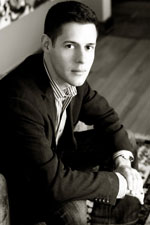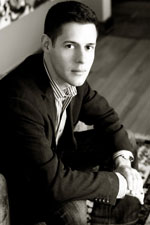Church Influences Academic Freedom?

Philosopher John Corvino was scheduled to speak at Providence College about same sex marriage (Courtesy of John Corvino)
October 17, 2013
The continuing controversy at Providence College in Rhode Island, which began three weeks ago when administrators at the Catholic institution canceled a lecture that was to be given by a notable philosopher in favor of same-sex marriage, has raised questions all over the country about what kind of influence the Church and its doctrine have on academic freedom and policy at affiliated schools. At Fordham, questions like these hit close to home.

In an exclusive interview, Christopher Arroyo, who received a Ph.D. in philosophy from Fordham in 2007 and is currently an associate professor of philosophy at Providence and the organizer of the canceled event, told The Observer about what’s been going on at his college in order to provide a point of comparison.
Same-sex marriage is “a real interest of mine,” Arroyo said. “I wanted to bring him to campus to speak about it, partly because of my own interest, but also because of what I teach in class and because I wanted my students to hear him speak on the subject, especially because he makes substantive moral arguments with respect to the morality of same-sex marriage. Those are the kinds of arguments that are welcome, or are often welcome at academic institutions that are Catholic. I thought it would be a very good thing for my students, for me and for the college.”
But on Sept. 21, Providence College’s Provost and Senior Vice President of Academic Affairs, Dr. Hugh Lena, disagreed, citing a portion of a document produced by the United States Conference of Catholic Bishops which states that “The Catholic community and Catholic institutions should not honor those who act in defiance of our fundamental moral principles. They should not be given awards, honors or platforms which would suggest support for their actions.” According to the Providence College website, Lena’s responsibility as a provost lies in “supporting and recognizing academic and service excellence” within the four schools of the college.
The initial reason for canceling the event, Lena said in that same email to Providence’s faculty, was a college policy which dictates that both sides of any contentious issue must be presented “fairly and equally.” Dana Dillon, a professor of theology at Providence, had agreed the week before to respond about the virtues of traditional marriage, but Lena said that she hadn’t been given adequate time to prepare, which was not fair or equal.
According to the college’s website, the event is rescheduled to occur during the spring semester and will be a debate. The announcement was made after The New York Times featured an article on the cancellation and students and faculty at the college planned an event called “Fighting for Academic Freedom,” which took place on Sept. 26, the same night that Corvino was first scheduled to speak.
Similar events have taken place at Fordham over the years.
As far back as 2006, a resolution was made in Fordham’s Faculty Senate to grant benefits to legally domiciled adults, a term which encompassed the disabled and/or elderly family members and same-sex partners of Fordham employees. Although that resolution was unanimously approved by the Faculty Senate, it took four years and a petition signed by more than 420 faculty members for the University to enact the policy changes.
In explaining the delay when it was again brought up by Senators in Dec. 2009, University President Rev. Joseph McShane, S.J., told the Faculty Senate that he “promised to speak with University Counsel and with Archbishop [Timothy] Dolan,” a vocal opponent of same-sex marriage, “about this issue, for it is important that the University maintain respect for Catholic moral teaching and that our relations with the Archbishop remain good,” according to Faculty Senate meeting minutes.
In 2011, Fordham partnered with four other schools to facilitate the event “More than a Monologue,” which sought to “open up various perspectives on the idea of sexual diversity and the Catholic Church, making it more possible to have a dialogue rather than just people basically sitting in corners stating their opinions,” said to one of the organizers, Christine Firer Hinze, professor of theology at Fordham College at Rose Hill (FCRH).
Referring to “thoughtful expressions of concern from many of the faithful” regarding “More than a Monologue,” Dolan said in a public statement that the Archdiocese of New York had “shared those concerns and our own with the Presidents of Fordham and Fairfield Universities,” the two Catholic universities in their dioceses that were involved with the event.
“Advertisements and commentary in advance of these conferences seemed to imply that they might encourage dissent from the Church’s teaching and from her teaching authority while advocating for erroneous opinions about sexuality dominant in our culture,” Dolan continued, ultimately reporting that “The Presidents of both universities listened to our concerns and brought them to the attention of the organizers of these conferences in their respective universities. Subsequently both Presidents helpfully assured us that these conferences, while sensitive to the experience of the participants, will not be a vehicle for dissent.”
“We were contacted by the President,” Hinze confirmed. “[McShane said] that he’d been in touch with Cardinal Dolan. The purpose of this was not to oppose Church teaching, but rather to let people talk about their actual experiences with sexual diversity and Catholicism honestly and respectfully. The Church,after all, is all of the people of the Church; to listen to all the people of the Church is part of being the Church,” she said.
“The communication we got from Father McShane,” she added, “was basically that, this question has been raised, [and he’d] assured the Cardinal that we’d be doing this event with integrity as an academic institution. I viewed Father McShane’s communication to our planning committee as an expression of support. Not as a caution or a ‘don’t do this.’”
The second organizer of Fordham’s conference, J. Patrick Hornbeck, a professor of theology at FCRH, did not respond to multiple requests for an interview.
In Dec. 2011, the Cardinal Newman Society, an organization devoted to “promoting and defending faithful Catholic education,” provided Dolan with an “investigative report” describing “More than a Monologue,” which had taken place a few months before, as being “sacrilegious” and accusing its organizers of “promoting dissent.” Less than a month later Dolan was invited to headline an event at Fordham School of Law at which he told students that public policy and law have come to ignore religion and adopt secular viewpoints based on “drifting dunes of utility, convenience, privacy and self-interest.” According to The Fordham School of Law Newsroom, he encouraged students to fight this change.
In May 2012, Pope Benedict XVI informed the United States Bishops that “the diversion of Catholic academic institutions from traditional Catholic teachings” was “the most urgent internal challenge facing the Catholic community in your country.”
When asked how much influence the Church actually yields over academic institutions like Fordham, Dean of Fordham College at Lincoln Center Rev. Robert Grimes, S.J., said that Fordham is “an independent university that is also Catholic. The independent part means that it has a Board of Trustees who are the owners and operators of it [Fordham] and that Board is not controlled in any way by the Church—the institutional Church. On the other hand, Cardinal Dolan can say whether or not we can call ourselves Catholic.”
“Certainly the Cardinal or Archbishop of New York could call up Father McShane, or call up the president of any institution and sort of say ‘I am not happy with this’ or ‘could you explain this?’” Grimes said. “But can he ban something? No. Can he say, ‘Fordham, you have to do this’—uh, no. He can say ‘Fordham you have to do this or you’re no longer Catholic.’ And then Fordham can do what it wants and see what he does.”









